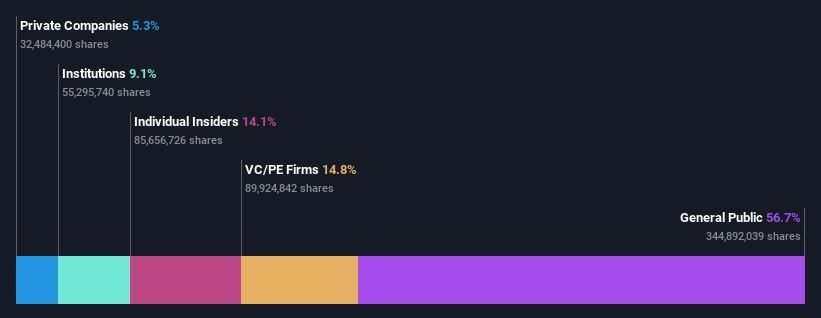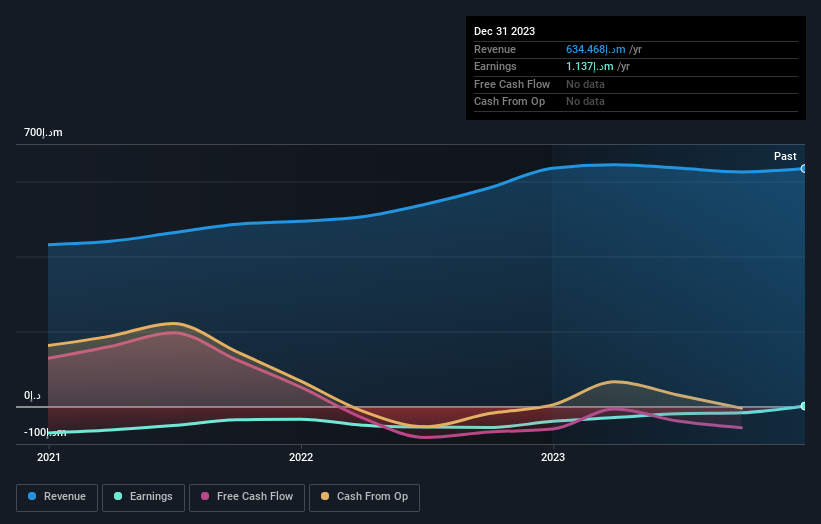Stock Analysis
- United Arab Emirates
- /
- Basic Materials
- /
- ADX:SCIDC
Sharjah Cement and Industrial Development Co. (PJSC)'s (ADX:SCIDC) biggest owners are retail investors who got richer after stock soared 12% last week

Key Insights
- The considerable ownership by retail investors in Sharjah Cement and Industrial Development (PJSC) indicates that they collectively have a greater say in management and business strategy
- A total of 5 investors have a majority stake in the company with 43% ownership
- Insider ownership in Sharjah Cement and Industrial Development (PJSC) is 14%
A look at the shareholders of Sharjah Cement and Industrial Development Co. (PJSC) (ADX:SCIDC) can tell us which group is most powerful. And the group that holds the biggest piece of the pie are retail investors with 57% ownership. In other words, the group stands to gain the most (or lose the most) from their investment into the company.
As a result, retail investors collectively scored the highest last week as the company hit د.إ380m market cap following a 12% gain in the stock.
In the chart below, we zoom in on the different ownership groups of Sharjah Cement and Industrial Development (PJSC).
See our latest analysis for Sharjah Cement and Industrial Development (PJSC)

What Does The Institutional Ownership Tell Us About Sharjah Cement and Industrial Development (PJSC)?
Many institutions measure their performance against an index that approximates the local market. So they usually pay more attention to companies that are included in major indices.
We can see that Sharjah Cement and Industrial Development (PJSC) does have institutional investors; and they hold a good portion of the company's stock. This suggests some credibility amongst professional investors. But we can't rely on that fact alone since institutions make bad investments sometimes, just like everyone does. It is not uncommon to see a big share price drop if two large institutional investors try to sell out of a stock at the same time. So it is worth checking the past earnings trajectory of Sharjah Cement and Industrial Development (PJSC), (below). Of course, keep in mind that there are other factors to consider, too.

We note that hedge funds don't have a meaningful investment in Sharjah Cement and Industrial Development (PJSC). Sharjah Asset Management is currently the company's largest shareholder with 15% of shares outstanding. In comparison, the second and third largest shareholders hold about 9.1% and 8.6% of the stock. Mohamed Ahmed Omar Al Karbi, who is the third-largest shareholder, also happens to hold the title of Member of the Board of Directors.
A deeper look at our ownership data shows that the top 5 shareholders collectively hold less than half of the register, suggesting a large group of small holders where no single shareholder has a majority.
While it makes sense to study institutional ownership data for a company, it also makes sense to study analyst sentiments to know which way the wind is blowing. Our information suggests that there isn't any analyst coverage of the stock, so it is probably little known.
Insider Ownership Of Sharjah Cement and Industrial Development (PJSC)
The definition of an insider can differ slightly between different countries, but members of the board of directors always count. The company management answer to the board and the latter should represent the interests of shareholders. Notably, sometimes top-level managers are on the board themselves.
I generally consider insider ownership to be a good thing. However, on some occasions it makes it more difficult for other shareholders to hold the board accountable for decisions.
It seems insiders own a significant proportion of Sharjah Cement and Industrial Development Co. (PJSC). Insiders have a د.إ54m stake in this د.إ380m business. It is great to see insiders so invested in the business. It might be worth checking if those insiders have been buying recently.
General Public Ownership
The general public -- including retail investors -- own 57% of Sharjah Cement and Industrial Development (PJSC). This level of ownership gives investors from the wider public some power to sway key policy decisions such as board composition, executive compensation, and the dividend payout ratio.
Private Equity Ownership
Private equity firms hold a 15% stake in Sharjah Cement and Industrial Development (PJSC). This suggests they can be influential in key policy decisions. Sometimes we see private equity stick around for the long term, but generally speaking they have a shorter investment horizon and -- as the name suggests -- don't invest in public companies much. After some time they may look to sell and redeploy capital elsewhere.
Private Company Ownership
Our data indicates that Private Companies hold 5.3%, of the company's shares. It's hard to draw any conclusions from this fact alone, so its worth looking into who owns those private companies. Sometimes insiders or other related parties have an interest in shares in a public company through a separate private company.
Next Steps:
While it is well worth considering the different groups that own a company, there are other factors that are even more important. Case in point: We've spotted 2 warning signs for Sharjah Cement and Industrial Development (PJSC) you should be aware of, and 1 of them doesn't sit too well with us.
Of course this may not be the best stock to buy. Therefore, you may wish to see our free collection of interesting prospects boasting favorable financials.
NB: Figures in this article are calculated using data from the last twelve months, which refer to the 12-month period ending on the last date of the month the financial statement is dated. This may not be consistent with full year annual report figures.
Valuation is complex, but we're helping make it simple.
Find out whether Sharjah Cement and Industrial Development (PJSC) is potentially over or undervalued by checking out our comprehensive analysis, which includes fair value estimates, risks and warnings, dividends, insider transactions and financial health.
View the Free AnalysisHave feedback on this article? Concerned about the content? Get in touch with us directly. Alternatively, email editorial-team (at) simplywallst.com.
This article by Simply Wall St is general in nature. We provide commentary based on historical data and analyst forecasts only using an unbiased methodology and our articles are not intended to be financial advice. It does not constitute a recommendation to buy or sell any stock, and does not take account of your objectives, or your financial situation. We aim to bring you long-term focused analysis driven by fundamental data. Note that our analysis may not factor in the latest price-sensitive company announcements or qualitative material. Simply Wall St has no position in any stocks mentioned.
About ADX:SCIDC
Sharjah Cement and Industrial Development (PJSC)
Sharjah Cement and Industrial Development Co.
Mediocre balance sheet with poor track record.

